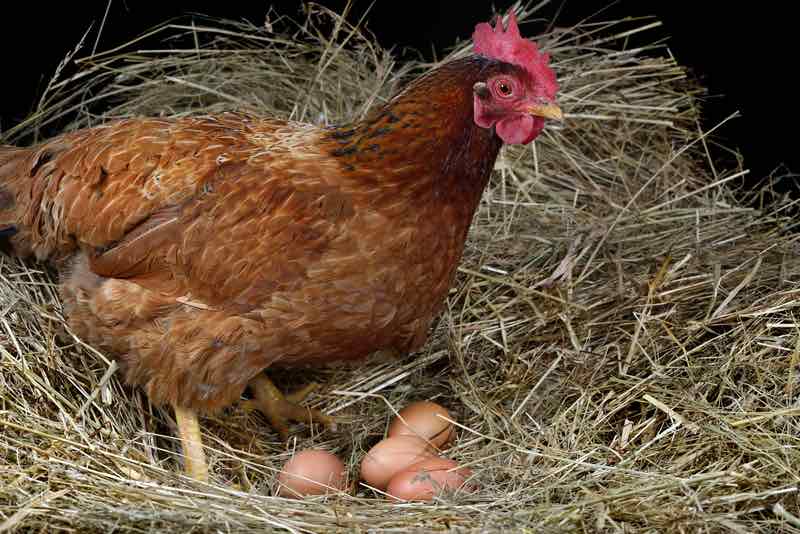So your chickens have stopped laying eggs, empty nests replace your once fruitful trips to the coop. But don’t worry, a lack of eggs doesn’t always mean the hens have quit laying for good. There’s usually a logical explanation for why your chickens have stopped laying eggs, and thankfully, an easy solution.
When chickens stop laying eggs, it’s usually due to biological factors, such as their natural cycle or age. However, diet, stress, and environment are also key elements in egg production.
You don’t have to be a detective to find out why your chickens aren’t laying eggs. Outside of the natural biology and lifecycle of chickens, there are several possible reasons for the stoppage. For more information on why your chickens have stopped laying eggs, keep reading.
Why Chickens Stop Laying Eggs
Before you go down the rabbit hole of worry, first take a look at your chicken’s lifestyle and immediate environment. Are there any changes you’ve recently made to their habitat? Was there an incident that could be upsetting the chickens?
If you can’t think of any adjustments that could account for extra stress or influence your chickens’ nutrition, then it’s possible that your chickens aren’t laying eggs due to their age or even their natural egg-laying cycle.
Environmental Factors
Environmental changes can, and will, stop chickens from laying eggs altogether. But, these factors are usually the ones that you have control over. Here are some of the most common environmental reasons that chickens stop laying eggs.
Poor Nutrition
Chickens need a balanced diet, just like humans. Both fat and sugar are guilty parties in:
- making chickens unhealthy,
- leading to the eventual stop in egg-laying.
The best way to make sure your chickens are getting the appropriate diet is to feed them quality chicken feed, balanced just for their needs.
But, chicken feed alone doesn’t provide all of the necessary nutrients. This makes feeding chickens a bit of a challenge until you find the right balance for your coop.
Chickens need additional calcium in their diet, along with protein. Here are some things you can add to chicken feed to ensure they’re getting the most balanced meals for egg production:
- Mealworms
- Leafy green veggies
- Crushed oyster shells
- Scrambled eggs
Stress and Anxiety
Chickens are a very anxious bird. And their nervousness spreads, so if one hen feels stressed, it can affect all of the others in the coop. Stress and anxiety are both factors that can stop chickens from laying eggs.
If you know your chickens are eating a healthy, well-balanced diet but they’re still not laying eggs, investigate the coop to see if there are any stressors that could be causing them not to lay eggs. Keep an eye out for any of these:
- Aggressive roosters: one bad rooster will spoil the bunch. He will kill your egg production, too. If you find a grumpy rooster is the root of the issue, it’s time for the rooster to move on to his own apartment, away from the ladies.
- Predators: even the family dog can be a predator to chickens, and when they’re living in fear, they can’t perform. If you don’t have a dog, there could be a wild animal stalking the coop, so be on the lookout.
- A traumatic event: chickens don’t handle grief very well. If the coop has recently lost a hen or even witnessed something happen to one of their fellow chickens, it’s possible that the event’s stress is causing them not to lay eggs.
- A new friend in the coop: adding a chicken to the coop can be a stressor, depending on the new chicken’s personality. If you already have a tight-knit group of hens, bringing in someone new will impact their egg-laying.
Too Many Hens
Nobody can get anything done with someone else breathing down their neck, right? Chickens feel the same. If there are too many cooks in the kitchen, er, hens in the coop, they won’t be comfortable laying eggs.
Chickens need to have room to roam in their coop without running into one another. Overcrowding will affect egg production and the coop’s overall mood, so it’s a double-edged sword.
You need to plan on about four square feet per chicken to make sure they have enough room to lay eggs comfortably. But, chickens also need to have access to safe space that they can roam as they choose.
Not Enough Sunlight
Chickens need the sun to lay eggs, just as much as they need a healthy and well-balanced diet. In fact, chickens should be spending at least 14-15 hours in the sun each day. Allowing your chickens to roam in a safe area outside of the coop can help them get enough sunlight, but adding a light inside the coop can help when this just isn’t possible.
Another benefit of adding the light inside the coop is that it will help keep your hens warm on chilly nights. They will not lay eggs for you if they get too cold.
Biological Factors
There are also a few factors that impact egg-laying that are out of anyone’s control. These are the ones that are a result of how chickens are wired. Biological factors that stop chickens from laying eggs include:
- Seasonal changes
- Age
- Brooding
- Breed
Seasonal Changes
Sunlight is an important element in egg-laying. When the days are shorter, chickens aren’t getting as much access to the sun as they do during the spring and summer. The lack of sunlight can result in chickens not laying eggs.
Another seasonal change is when chickens enter their molting season. Although this is typically in the fall, you’ll be able to tell for sure by the sheer number of feathers that are flying through the air. Chickens will shed their old feathers for new ones to keep them warm and toasty in the winter.
Chickens will stop laying eggs during molting season, a time that chicken owners refer to as a laycation. While the chickens are busy growing their new feathers, their bodies take a break from egg-laying.
Age
Once a hen has passed her prime egg-laying years, she gets to retire from egg-laying all together. If you have an older chicken that’s stopped laying eggs, it might just be her time to call it quits. Chickens are usually about four or five when they start to slow in egg production, and by the time they’re seven, they’re usually done.
Brooding
When a woman is pregnant and feeling the urge to prepare her home for a baby, it’s known as nesting… when this happens to a chicken, it’s brooding. Chickens that are brooding start feeling their mama bird instincts take over, but they don’t lay eggs.
But, when one hen feels broody, she can put a damper on her friends’ egg-laying, too. If you notice that one hen is broody, but egg-laying for the whole coop has gone down, you might need to separate the broody hen until she’s done.
Breed
Some chickens are just really good at laying eggs. A few breeds are notorious for laying a lot of eggs without taking many breaks. Then again, some breeds are known to stop laying eggs more than others. Silkies are a popular breed of chicken, but they don’t lay nearly as many eggs as others, like the Rhode Island Reds.
Final Thoughts
It’s easy to get discouraged and blame yourself when your chickens stop laying eggs. But most of the time, it’s not anything you have (or haven’t) done. Unless you have an older chicken or one that’s just taking an egg-laying hiatus, chances are you can encourage her to get back to laying with a simple fix.
The best way to find out why your hens are not laying eggs is to keep an eye on your flock and monitor them closely.

